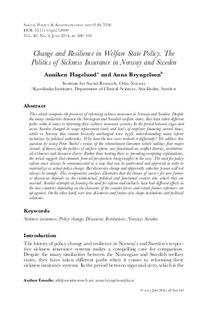| dc.contributor.author | Hagelund, Anniken | |
| dc.contributor.author | Bryngelson, Anna | |
| dc.date.accessioned | 2017-11-21T09:07:51Z | |
| dc.date.available | 2017-11-21T09:07:51Z | |
| dc.date.created | 2013-09-17T13:32:04Z | |
| dc.date.issued | 2014 | |
| dc.identifier.citation | Social Policy & Administration. 2014, 48 (3), 300-318. | |
| dc.identifier.issn | 0144-5596 | |
| dc.identifier.uri | http://hdl.handle.net/11250/2467265 | |
| dc.description.abstract | This article compares the processes of reforming sickness insurance in Norway and Sweden. Despite the many similarities between the Norwegian and Swedish welfare states, they have taken different paths when it comes to reforming their sickness insurance systems. In the period between 1990 and 2010 Sweden changed its wage replacement levels and levels of employer financing several times, while in Norway they remain basically unchanged since 1978, notwithstanding many reform initiatives by political authorities. Why have the two cases evolved so differently? We address this question by using Peter Starke’s review of the retrenchment literature which outlines four major strands of theorizing the politics of welfare reform: neo-functionalism, conflict theories, institutionalist theories and discourse theory. Rather than treating these as providing competing explanations, the article suggests that elements from all perspectives bring insights to the case. The need for policy reform must always be communicated in a way that can be understood and approved in order to materialize as actual policy change. But discursive change and apparently seductive frames will not always be enough. This comparative analysis illustrates that the chance of success for new frames or discourses depends on the institutional, political and functional context into which they are inserted. Similar attempts at framing the need for reform and cutbacks have had different effects in the two countries depending on the character of the counter forces and extant frames reformers are up against. On the other hand, over time discourses and frames also shape institutions and political relations. | |
| dc.language.iso | eng | |
| dc.title | Change and Resilience in Welfare State Policy : The Politics of Sickness Insurance in Norway and Sweden | |
| dc.type | Peer reviewed | |
| dc.type | Journal article | |
| dc.description.version | publishedVersion | |
| dc.source.pagenumber | 300-318 | |
| dc.source.volume | 48 | |
| dc.source.journal | Social Policy & Administration | |
| dc.source.issue | 3 | |
| dc.identifier.doi | 10.1111/spol.12009 | |
| dc.identifier.cristin | 1049961 | |
| dc.relation.project | Norges forskningsråd: 193631 | |
| cristin.unitcode | 7437,0,0,0 | |
| cristin.unitname | Institutt for samfunnsforskning | |
| cristin.ispublished | true | |
| cristin.fulltext | original | |
| cristin.qualitycode | 1 | |
